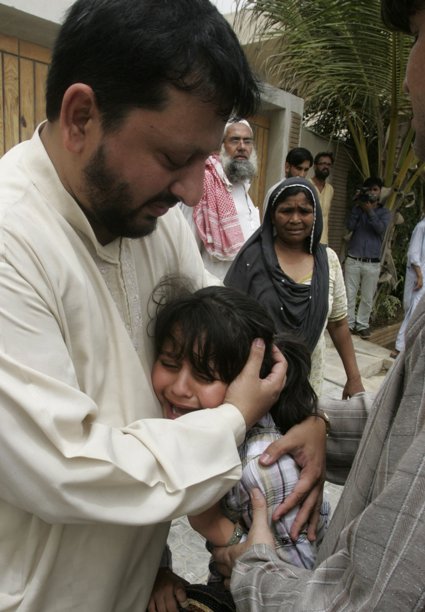Ashraf Khan
Karachi, Pakistan (AP): Pakistan’s main intelligence agency issued a rare media statement Wednesday to deny it was behind the abduction and killing of a journalist who was investigating terrorism.
Speculation that the Inter-Services Intelligence (ISI) was linked to the slaying of Syed Saleem Shahzad has added to pressure on the agency, already facing international suspicions that elements within it sheltered Osama bin Laden in an army town before he was killed there last month by American commandos.
Before Shahzad was killed, he told a human rights activist that he had been threatened by intelligence agents. His body was found Tuesday showing signs of torture and he was buried on Wednesday.
The ISI operates largely outside of the law and routinely detainees suspected militants, political activists and separatists, without charge. They can be held for months, if not years, in secret prisons. In Baluchistan province, rights activists accuse the agency of killing rebels after abducting them.
Internationally, the agency is best known for its alleged support of Islamist militants, especially those fighting in Afghanistan and India. A trial in Chicago of a man accused in the 2008 Mumbai attacks has heard testimony over the last week from an American-Pakistani alleging ISI officers were involved in the plot.

Family members of slain Pakistani journalist Syed Saleem Shahzad mourn over his death in Karachi, Pakistan, on Wednesday. (AP photo)
The ISI statement, in the form of a story carried by the state-owned Associated Press of Pakistan, quoted an unidentified intelligence official.
In a statement from New York, Hameed Haroon, president of the All Pakistan Newspapers Society, hotly rejected the ISI denial. He wrote that Shahzad sent him emails detailing his interrogations by Pakistani security, including an implicit threat on his life.
“It is regrettable that some sections of the media have taken upon themselves to use the incident for targeting and maligning the ISI,” the official was quoted as saying. The agency’s operatives occasionally brief journalists, but do not normally release information through APP.
Just last week, Shahzad wrote a story about the alleged al-Qaida infiltration of the navy. He wrote the story after a 17-hour insurgent siege of a naval base in Pakistan’s south. That only compounded the embarrassment of the country’s security agencies.
Within days, Shahzad vanished. His wife contacted Hasan, the rights activist, as Shahzad had asked in case he disappeared. Hasan has said he was told by Pakistani government officials that they believed Shahzad was in ISI custody.
In recent weeks, Pakistan’s news outlets have produced scathing coverage of the security establishment, prompted by its being caught unawares by the May 2 U.S. raid that killed bin Laden in Abbottabad in northwest Pakistan, as well questions over how it did not know the terror chief was living there. There are also suspicions that elements within the ISI may have sheltered bin Laden.
Shahzad came under ISI scrutiny in October when he wrote in the Asia Times that Pakistan had freed a detained Afghan Taliban commander. Within days, he was summoned to an ISI office, according to an email he sent to Ali Dayan Hasan, a researcher for Human Rights Watch. Intelligence officials pressured him to reveal his sources or retract the story. He refused.
At the end of the meeting, one of the intelligence officials issued what he took as a veiled threat. The official told Shahzad intelligence agents had recently arrested a terrorist who was carrying a hit list. The official then said he would tell Shahzad if his name was on the list.
The APP report quoted the ISI officer as saying there was “nothing sinister” about the meeting.
The official said the ISI would “leave no stone unturned in helping to bring the perpetrators of this heinous crime to justice,” but warned that “the media should act with responsibility to avoid any possible legal” problems. It did not elaborate.
Shahzad, who was abducted in the capital Islamabad on Sunday night, was a well-known journalist who wrote for the Asia Times Online and other publications. He regularly investigated sensitive topics, such as the alleged ties between militants and the state.
Shahzad’s apparently tortured body was found dozens of miles outside Islamabad on Tuesday, police said. His murder drew widespread condemnation in Pakistan and abroad, including from U.S. Secretary of State Hillary Rodham Clinton. She said Shahzad’s reporting “brought to light the troubles extremism poses to Pakistan’s stability,” and declared U.S. support for the Pakistani government investigation into the killing.

People carry a coffin containing the body of Pakistani journalist Syed Saleem Shahzad at Karachi airport in Pakistan on Wednesday. (AP photo)
In London, British Foreign Secretary William Hague expressed “shock” over the killing and welcomed the investigation. Shahzad “courageously reported on the terrorism and extremism which has caused so much suffering to the people of Pakistan,” Hague said. “His death highlights the dangers faced by those working for a stable Pakistan.”
The 40-year-old was buried in his hometown, Karachi, where the service was attended by hundreds of friends, relatives, political figures and journalists.
“We will not shut our voices down,” said Azhar Abbas, a prominent Pakistani journalist. “The journalist community is united on this. We will not stop ”
Pakistan was the deadliest country for journalists in 2010, with at least eight killed in the line of duty, according to the New York-based Committee to Protect Journalists. Six died in suicide attacks, the group said in a report late last year.
Despite the dangers, the media establishment in Pakistan has expanded rapidly over the past decade, and reporters here operate with freedoms denied in most developing countries.
In a statement, Clinton said Shahzad’s reporting “brought to light the troubles extremism poses to Pakistan’s stability,” and said the U.S. supports the “Pakistani government’s investigation into the circumstances surrounding his death.”
(Additional reporting by Associated Press writer Cassandra Vinograd in London)






















